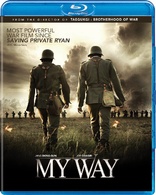My Way Blu-ray Movie
HomeMy Way Blu-ray Movie 
마이웨이 / Mai WeiWell Go USA | 2011 | 143 min | Rated R | Jul 24, 2012
Movie rating
7.6 | / 10 |
Blu-ray rating
| Users | 3.8 | |
| Reviewer | 4.0 | |
| Overall | 3.8 |
Overview
My Way (2011)
Inspired by a true story. Jun Shik works for Tatsuo's grandfather's farm while Korea is colonized by Japan, but he has a dream to participate in Tokyo Olympics as a marathon runner. Tatsuo also aims to become a marathon runner, so the two are in rivalry. But war breaks out and they both are forced to enlist in the army...
Starring: Fan Bingbing, Kim In-kwon, Jang Dong-gun, Joe Odagiri, Lee Yeon-heeDirector: Kang Je-kyu
| Foreign | Uncertain |
| War | Uncertain |
| History | Uncertain |
| Drama | Uncertain |
| Action | Uncertain |
Specifications
Video
Video codec: MPEG-4 AVC
Video resolution: 1080p
Aspect ratio: 2.35:1
Original aspect ratio: 2.39:1
Audio
Korean: DTS-HD Master Audio 5.1
English: DTS-HD Master Audio 5.1
Korean: Dolby Digital 2.0
English: Dolby Digital 2.0
Subtitles
English
Discs
50GB Blu-ray Disc
Single disc (1 BD)
Packaging
Slipcover in original pressing
Playback
Region free
Review
Rating summary
| Movie | 4.0 | |
| Video | 4.5 | |
| Audio | 5.0 | |
| Extras | 1.5 | |
| Overall | 4.0 |
My Way Blu-ray Movie Review
. . .not, repeat not, a Frank Sinatra biopic.
Reviewed by Jeffrey Kauffman July 23, 2012Since one of My Way’s huge set pieces involves the Allied invasion of Normandy on D-Day, and perhaps because the film itself bears a pull quote comparing it to the Spielberg film, it is easy to call this epic 2011 Korean film a sort of Eastern Saving Private Ryan. But there are a number of other equally apt filmic references in My Way, including outings as disparate as Chariots of Fire, The Bridge On the River Kwai and just for good measure a smattering of North By Northwest. The film itself begins with this textual epigraph:
-
An Asian man wearing a German uniform was discovered by the U.S. Military at Normandy on D-Day, 1945
[sic—D-Day was actually 1944]. Upon
questioning, he was identified as a Korean.
Korea was under Japanese occupation during World War II and many Koreans were forced into the Japanese army and sent to the frontlines against China and the Soviet Union.
This film is based upon true events.

Though the slim supplementary features included on this Blu-ray don’t really provide adequate information, it appears that My Way was inspired by the discovery of a Korean body in a German uniform that was among the casualties of D-Day (even if the above epigraph makes it seem like the soldier was found alive). There may have also been a Korean documentary about this subject, but I haven’t been able to confirm that. Co- writer and director Kang Je-Kyu has fashioned a huge, old fashioned epic spanning decades around this one salient piece of information, weaving in a number of tangential elements but keeping the focus squarely on the changing relationship between the central Korean and Japanese characters. (It should be noted that Je-Kyu’s name is transliterated on the Blu- ray and in the film as it is spelled here, though other sources often offer it as Je-Gyu.)
Though we meet Jun-shik and Tatsuo as children, and are quickly given a précis of their characters—Jun-shik the simple Korean country farm boy and Tatsuo the uppity and arrogant Tokyo born and bred Japanese—the bulk of the film deals with the two as adults, with Jang Dong-gun portraying Jun-shik and Joe Odagiri portraying Tatsuo. When the two meet as children, they immediately start bragging about their running abilities, and almost instantaneously launch into a race, the first of several such races that will carry them through their adolescence and early adulthood (shown in a good old fashioned montage sequence, replete with newspaper headlines twirling out at the viewer). Things get serious when Japan, which has been occupying Korea, refuses to let any Korean runners compete in the Olympics. The machinations of the one former Korean gold medal winner gets Jun-shik a shot at trying out, and even though Jun-shik wins the race, the Japanese refuse to award him a spot on the team, accusing him of cheating and just for good measure holding him responsible when a riot breaks out, conscripting him, along with several of his Korean friends, into the Japanese army to fight the “Soviet menace”.
That sets the film out on its long and often violent second act, where Jun-shik finds himself a virtual prisoner transported to various places and realizes he has virtually no say in his fate (in this way, one might find yet another film to compare My Way to: Ben-Hur.) Tatsuo of course shows up as a commanding officer, more vicious than ever and he makes a special target out of his old running nemesis. Ultimately Tatsuo forces Jun-shik, along with most of the rest of the Koreans in the brigade, to take part in a suicide mission. Jun-shik’s successful attempt to escape is thwarted at the last moment when he sees a horde of invading Soviet tanks, and rushes back to the camp to try to save his Korean buddies. That decision soon has devastating consequences for both Jun-shik and Tatsuo, both of whom end up being conscripted into the Soviet army to fight the “Nazi menace”.
As should probably be obvious by this point, part of Je-Kyu’s thesis here is the absolute absurdity of nationalistic zeal, as both Jun-shik and Tatsuo end up fighting in other nations’ uniforms simply to stay alive, in itself a rather ironic statement, considering the circumstances. The film is occasionally heavy handed in these elements, especially when Tatsuo quasi-hallucinates about his own zealotry in forcing soldiers to fight to their deaths as he’s being forced to fight to his death by a Soviet commander. But the underlying message here is valid, and with the incredibly visceral battle sequences which dot My Way’s territory, it’s hard not to take the message to heart. (This film features some really gruesome imagery, so those with squeamish stomachs are forewarned.)
The film goes slightly awry in its third act, when Jun-shik and Tatsuo are the only survivors of a horrifying Soviet-German battle. They both don German clothing and set out to make it over “the mountains” to safety. In yet another “what uniform will they wear now?” moment, Jun-shik is taken prisoner by Germans while we see Tatsuo, perhaps mortally wounded, lying shivering in an abandoned house. We then segue forward three years to find Tatsuo on a German work crew preparing defenses on the Normandy beach, with Jun-shik nowhere in sight. Of course, soon the Korean hero turns up, running along the beach (Jun-shik’s unwillingness to give up a running regimen is a recurring motif in the film). The reuniting of these two former enemies is awkward, both internally but in terms of the film’s dynamics as well. Tatsuo has basically been cast as the evil overlord for so much of the film, even when he is forced into an underling position, that this gloriously filmed moment doesn’t quite ring true. One almost expects the two to hug to a swell of orchestral strings, but wisely Je-kyu doesn’t go that far.
The film’s final big battle is, of course, the D-Day invasion, when once again Jun-shik (along with Tatsuo) has planned an escape (without even knowing the invasion is about to take place), only to see his plans thwarted by fate. There’s a bittersweet ending here, one which uses a bookending device which won’t be spoiled here, but which goes a long way to rehabilitating Tatsuo’s character and to letting the audience leave on about as hopeful a note as possible, considering the death and destruction that they’ve witnessed for the previous two and a half hours.
My Way is a huge and often impressive production (it’s evidently the most expensive film ever made in South Korea). Its epic sweep will no doubt be appealing to those who like huge historical opuses built up around intriguing characters. The performances are largely excellent (a few of the supporting turns are a bit problematic, but since so much of the film hinges on Jun-shik and Tatsuo, the damage is negligible), and Je-kyu stages things brilliantly, even if he goes for a bit too much gruesome gusto in the film’s big battle set pieces (how many times do we need to see a tank vivisect a soldier by running over him?). The rapprochement between Jun-shik and Tatsuo at the film’s denouement seems to be just slightly false feeling, though what it does is alert to the viewer to the fact that the “real” character arc here may be that of the Japanese, not the Korean.
My Way Blu-ray Movie, Video Quality 

My Way is presented on Blu-ray courtesy of Well Go USA with an AVC encoded 1080p transfer in 2.35:1. This Red One shot feature looks impeccably sharp and well detailed almost all of the time, though one should be prepared for the typical DI color tweaking, which casts things like battle scenes in a sort of slate gray to ice cold blue hue and scenes of the runners' childhoods in amber gold. Fine object detail is exceptionally clear and strong, and the CGI work in the battle sequences is very well woven into the fabric of the film. There are occasional stability issues here to report, notably on objects like car grilles and overhead shots of tiled roofs (which have the same sort of parallel lines going on that the car grilles do), but otherwise this is a really sharp and appealing high definition presentation, with strong contrast, excellent black levels and amazing clarity.
My Way Blu-ray Movie, Audio Quality 

My Way has a quartet of audio options, two lossless DTS-HD Master Audio 5.1 mixes, one in the original Korean (for the most part—see below), and another in English. Two standard Dolby Digital 2.0 mixes are also included, in Korean and English. This is thrilling audio, one that will leave your floorboards rumbling in several battle scenes which offer astounding LFE. Directionality is intense and consistent, brilliantly utilized throughout the film to create a very believable and realistic sense of immersion. While this is of course most noticeable in the huge battle set pieces, there's really fine attention paid to discrete channelization in everything from dialogue to ambient environmental effects. The film's dialogue, which is mostly in Korean but also includes snippets of everything from Russian to German to English (even in the Korean mix), is very clearly and cleanly presented as well. The closing ballad is a little over the top, with an English lyric and a singer who sounds like Josh Groban on steroids, but even here, as with the rest of the film, fidelity is top notch.
My Way Blu-ray Movie, Special Features and Extras 

- Making Of (SD; 9:03) features some interesting behind the scenes footage, including a couple of the film's big set pieces.
- Interview With Jang Dong-Gun and Director Kang Je-Kyu (SD; 5:52) has Jang Dong-Gun talking about a documentary called A Korean in Normandy which helped inform his portrayal of Jun-Shik in the film. Director Kang Je- Kyu also talks about how a picture taken at Normandy sparked the genesis of the film.
- Theatrical Trailer (HD; 1:59)
- Home Video Trailer (HD; 2:11)
- International Trailoer (HD; 2:56)
My Way Blu-ray Movie, Overall Score and Recommendation 

Though My Way runs around two and a half hours, it never feels slow or, conversely, bloated. The central relationship between Jun-shik and Tatsuo is handled extremely well, for the most part at least, and even if the final rapprochement seems highly unlikely, the rest of the film is a blistering exposé of the madness of war and extreme nationalism. This is one of the most impressive foreign made epics of the past several years, and anyone who loves big historical dramas, especially war-related ones, will no doubt be intrigued by this film. While this Blu-ray supplements are on the slim side, the video is excellent and the audio is astounding. Highly recommended.
Similar titles
Similar titles you might also like

The Front Line
고지전 / Go-ji-jeon
2011

Land of Mine
Under Sandet
2015

War of the Arrows
Choi-jong-byeong-gi Hwal
2011

Assembly
Jí Jié Hào
2007

The Captain
Der Hauptmann
2017

Generation War
Unsere Mütter, unsere Väter
2013

9th Company
9 rota | Collector's Edition
2005

City of Life and Death
南京!南京! / Nanjing! Nanjing!
2009

Letters from Iwo Jima
2006

The Flowers of War
金陵十三钗 / 金陵十三釵 / Jīnlíng Shísān Chāi
2011

Das Boot
The Director's Cut | Single-Disc Edition
1981

Battle of the Warriors
墨攻 / Battle of Wits / Battle of Kingdoms
2006

Stalingrad
1993

Cross of Iron
1977

The Warlords
Tau ming chong
2007

White Vengeance
鴻門宴
2011

Europa Europa
1990

Genghis Khan: To the Ends of the Earth and Sea
Aoki Ôkami: chi hate umi tsukiru made
2007

Red Cliff: Part I & Part II
赤壁 / 赤壁:决战天下 | Chi Bi | Original International Version
2008

A Bridge Too Far
1977
